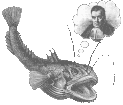UW Aquatic & Fishery Sciences Quantitative Seminar
Megan Stachura
Northwest Fisheries Science Center
A bio-economic model of marine recreational fisheries off Washington and Oregon
Abstract
Recreational fisheries make up a substantial portion of catch for many West Coast stocks and are economically, socially, and culturally important. It is difficult to predict how changes in recreational fisheries regulations (e.g. bag limits, size limits, seasonal closures) will influence recreational angler effort and recreational fishing mortality for both targeted and bycatch stocks. To better understand this, we are building a bio-economic model of marine groundfish and salmon recreational fisheries off Washington and Oregon. The economic component of this model is based on a mixed logit random utility model built on discrete choice experiment survey data. The biological component is based on stock assessment models, and for this reason we focus on recreationally important stocks that have stock assessments (e.g. lingcod, black rockfish) and overfished stocks for which bycatch in the recreational fishery may be important (e.g. yelloweye rockfish). I will present an overview of the current model and future directions for this work.

